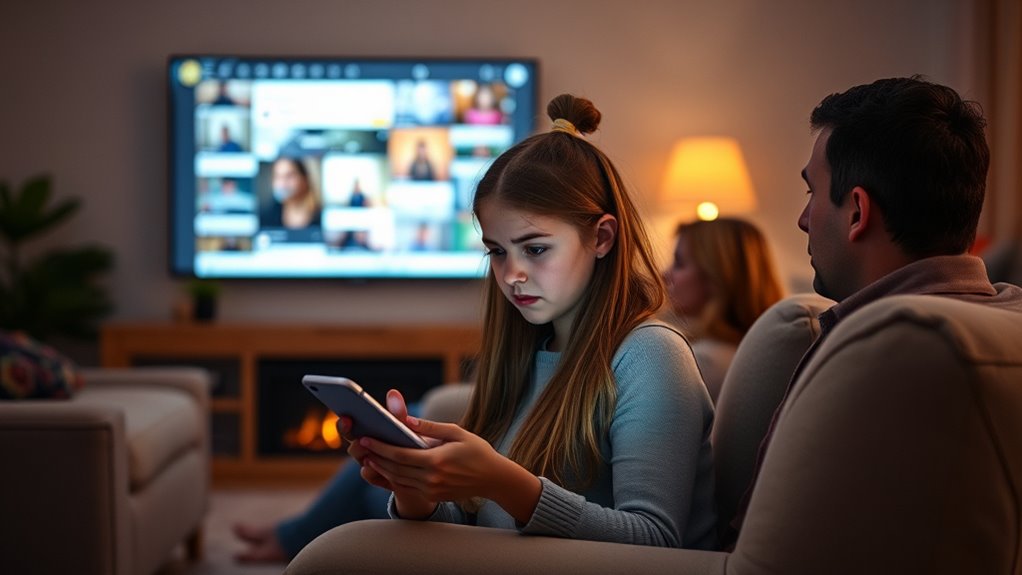To protect your family’s mental well-being from social media’s effects, set clear boundaries on usage and encourage offline activities. Be mindful of digital addiction and avoid seeking validation online, which can harm self-esteem. Promote open conversations about online experiences, and focus on strengthening relationships beyond screens. Recognizing the impact of curated content and comparison helps maintain healthy perspectives. Exploring more strategies can help you create a balanced online environment for your family’s overall happiness and resilience.
Key Takeaways
- Limit social media usage and establish clear boundaries to prevent dependence and reduce negative impacts on family members.
- Encourage real-world interactions to strengthen family bonds and promote mental well-being.
- Educate family members about the risks of social media comparison and online validation.
- Promote mindfulness and self-awareness to help family members recognize digital addiction signs.
- Foster a supportive environment that values authentic happiness beyond online validation.

Have you ever wondered how social media impacts your mental health? It’s a question more people are asking as they notice how often they check their feeds or feel anxious if they don’t receive enough likes or comments. One major issue is digital addiction, which can sneak up on you without you realizing it. You might start scrolling out of habit or boredom, but soon it becomes a compulsive behavior that’s tough to break. This constant need for online validation keeps you hooked, making it harder to disconnect and focus on real-life relationships and activities. When you rely heavily on social media for approval, your self-esteem can take a hit, especially if your posts don’t get the reactions you hope for. This cycle of craving validation can lead to feelings of inadequacy, anxiety, and even depression. It’s a tricky balance because social media offers quick ways to boost your confidence temporarily, but it can also undermine your sense of worth if you become dependent on those digital affirmations. Recognizing this pattern is the first step toward protecting your mental health.
As you spend more time seeking online validation, you may start comparing yourself to others more often. Social media amplifies curated images of perfection, making it easy to fall into the trap of believing everyone else’s life is better or more exciting than yours. This comparison can fuel feelings of envy, loneliness, and dissatisfaction with your own life. The constant exposure to idealized versions of others’ experiences often skews your perception, leading you to overlook your own accomplishments and happiness. Instead of feeling inspired, you might feel inadequate. Being aware of how much you’re influenced by these comparisons helps you regain perspective. Try to remind yourself that many posts are carefully curated and don’t reflect reality. Limit your time on social media and focus on real-world connections that nourish your mental health, rather than fleeting online approval. Establishing boundaries around your usage can prevent digital addiction from taking hold and help you find a healthier, more balanced approach.
Additionally, practicing mindfulness and vibrational awareness can help you stay grounded and reduce the impact of social media on your emotional well-being. Ultimately, understanding the relationship between social media, digital addiction, and online validation empowers you to make smarter choices. You don’t have to completely disconnect, but being intentional about your online habits can make a big difference. Prioritize activities that genuinely bring you joy and fulfillment, like spending time with family or pursuing hobbies. Remember, your self-worth isn’t determined by likes or followers. Protecting your mental health means recognizing these influences and taking steps to limit their impact. By doing so, you’ll foster stronger family bonds, enhance your well-being, and find a more authentic sense of happiness beyond the screen.
Frequently Asked Questions
How Can Parents Effectively Monitor Teens’ Social Media Use?
You can effectively monitor your teens’ social media use by establishing clear digital boundaries and maintaining ongoing parental involvement. Set rules about screen time and online behavior, and regularly check in with your teen about their digital activities. Use parental controls where appropriate, but also foster open communication so they feel comfortable sharing their online experiences. Balancing oversight with trust helps protect their well-being and encourages responsible social media use.
What Are Signs of Social Media Addiction in Family Members?
A warning sign is when you notice behavioral changes or excessive screen time that disrupt daily routines. You might see family members becoming irritable, withdrawn, or neglecting responsibilities. Remember, “You are what you repeatedly do,” so if screen time dominates their life and they show signs of social withdrawal or mood swings, it could indicate social media addiction. Stay observant and communicate openly to address these concerns early.
How Does Social Media Impact Sleep Patterns and Overall Health?
Social media can cause sleep disruption by keeping you awake late at night, scrolling or engaging online. This lack of quality sleep affects your physical health, leading to fatigue, weakened immune function, and increased stress. When you prioritize device-free time before bed, you improve sleep patterns and support overall health. Protect your well-being by setting boundaries around social media use, especially during nighttime hours.
Are Certain Social Media Platforms More Harmful to Mental Health?
Some social media platforms are more harmful than others, especially if they lack effective content moderation. For example, platforms with unchecked content can expose you to negativity and misinformation, impacting mental health. Comparing platforms, you’ll find that those prioritizing mental well-being with better moderation and positive community features tend to be less harmful. So, choose your platforms wisely, and keep an eye on how they influence your mood and self-esteem.
What Community Resources Are Available for Families Coping With Social Media Stress?
You can access community counseling services that specialize in social media stress, offering personalized support for your family. Online support groups also provide a safe space to share experiences and gain advice from others facing similar challenges. These resources help you navigate social media’s impact, build resilience, and foster open communication within your family, ensuring you don’t have to face social media stress alone.
Conclusion
So, next time you scroll endlessly, remember you’re not just wasting time—you’re also risking your mental health and your family’s peace. Maybe consider a break; after all, your online life isn’t more important than real conversations around the dinner table. Think of social media as that clingy friend who’s always around but never really helps you feel better. Protect your well-being, because your family deserves your best, not your digital distraction.










